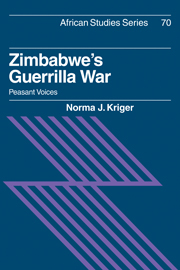Book contents
- Frontmatter
- Contents
- List of maps
- Acknowledgements
- Introduction
- 1 Peasant revolutions: theories and methods
- 2 Inequalities and peasant grievances
- 3 Strategies, goals and appeals: continuity and change
- 4 Guerrilla–civilian relations: the issue of popular support
- 5 Struggles in the struggle
- 6 Legacies of the war for peasants
- 7 Conclusion
- Appendix: Field research
- Notes
- Bibliography
- Index
- Other books in the series
6 - Legacies of the war for peasants
Published online by Cambridge University Press: 05 January 2012
- Frontmatter
- Contents
- List of maps
- Acknowledgements
- Introduction
- 1 Peasant revolutions: theories and methods
- 2 Inequalities and peasant grievances
- 3 Strategies, goals and appeals: continuity and change
- 4 Guerrilla–civilian relations: the issue of popular support
- 5 Struggles in the struggle
- 6 Legacies of the war for peasants
- 7 Conclusion
- Appendix: Field research
- Notes
- Bibliography
- Index
- Other books in the series
Summary
Understanding the revolutionary mobilization process is important in itself but also because of its alleged links with post-revolutionary outcomes. Chapter 1 discussed how extensive peasant mobilization during a revolution is often linked to peasant participation in state and party institutions and potential for socialist transformation after the revolution. Such propositions, whether applied to China, Mozambique, or Guinea-Bissau, attribute the potential for socialism to the role of a party with a socialist ideology that controls liberated areas and enjoys peasants' popular support during the revolutionary process. Linked as these propositions are to the mobilization process, it is unsurprising that they too focus on peasant relations with the state and revolutionary party, neglect internal struggles within the peasantry, and rely on sources other than peasant interviews.
In contrast to studies of China, Mozambique, and Guinea-Bissau, that highlight the role of the revolutionary party's socialist ideology and control of liberated areas, studies of Zimbabwe usually acknowledge that ZANU's socialist ideology was poorly developed and that ZANU guerrillas did not win control of liberated areas. Yet several analysts of Zimbabwe link party mobilization during the war to post-independence outcomes. John Saul and Lionel Cliffe argue that armed struggle raised the political consciousness of guerrillas and peasants and made the latter more aware of their grievances as an exploited class. Moreover, the radicalizing effect of popular guerrilla struggle also promoted the ideological development of some leaders in the armed struggle, even though the most radical of them (i.e. those most closely involved in the guerrilla war) were defeated in a leadership struggle.
- Type
- Chapter
- Information
- Zimbabwe's Guerrilla WarPeasant Voices, pp. 212 - 236Publisher: Cambridge University PressPrint publication year: 1991



